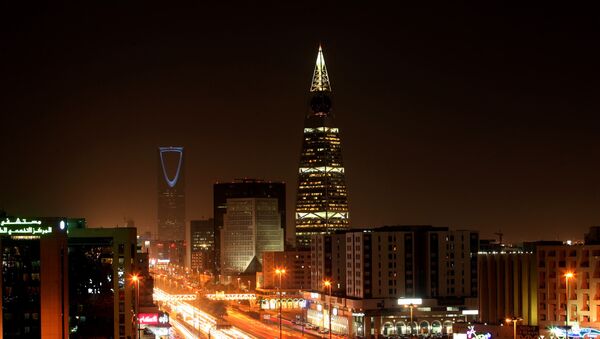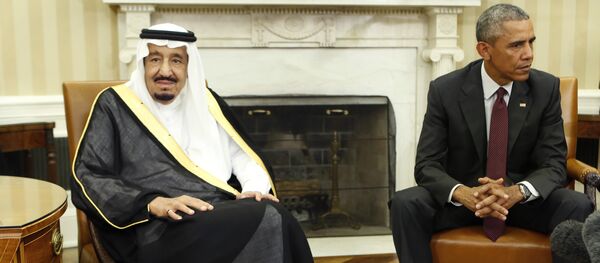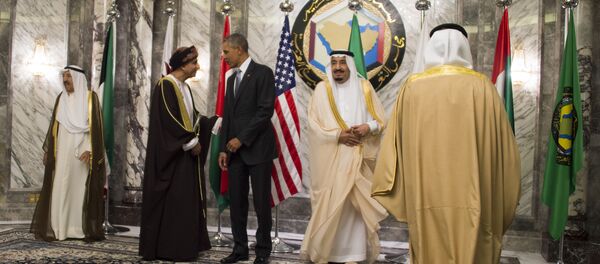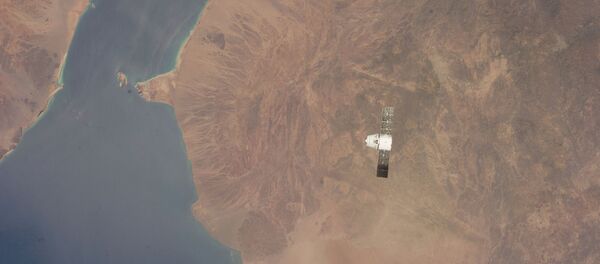In her recent analysis for the Moscow-based analytical service Vneshnyaya Politika, Tyukaeva recalled that over the past month, Saudi policymakers have been busy. "April saw five events which were significant for Riyadh: a five-day visit by King Salman to Egypt; then his visit to Turkey to meet with Recep Tayyip Erdogan and to attend a summit of the Organization of Islamic Cooperation; after that there was Barack Obama's visit to the Kingdom for talks with the Saudi monarch, and the Gulf Cooperation Council summit."
The 'post-Iran deal' concept has been widely used by Arab media and experts to describe new realities, Tyukaeva notes. "The event has become a reference point for regional foreign policy elites, from which they now find it necessary to find new paths, new solutions and a new balance of power in the Middle East."
"Riyadh, for whom Iran's position in the Middle East since 1979 has played a decisive factor in the formation of its own foreign policy, wants to be the leader of the process to find a new equilibrium. However, the Saudis' attempts to find new solutions, expressed primarily in grand gestures, symbolic speeches and large-scale projects, are beginning to look more and more like attempts to 'revive a corpse'," rather than real solutions.
Focusing on the flurry of visits and negotiations which took place last month, Tyukaeva suggested that "on closer examination, only the environment in which Riyadh is forced to operate has changed; its actions have not."
"The common thread of the statements by the US president, the same as it was at the summit in Camp David a year ago, was the idea that, despite the warming of relations between Washington and Tehran, the US would condemn any Iranian activities to destabilize the region, and would remain ready to respond to provide security to its partners in the Gulf."
"The parties agreed to joint patrols of sea routes to intercept Iranian efforts to supply weapons to countries of the region, and to cooperation in the field of missile defense and cyber security (which, admittedly, was the same thing that was discussed last year, with specific agreements yet to be reached). It was announced that the US and the GCC would conduct joint military exercises in 2017."
A far more interesting development, Tyukaeva says, was King Salman's five day visit to Egypt at the beginning of last month, where he met with Egyptian President Abdel Fattah el-Sisi and was awarded the country's highest national honor – the Order of the Nile.
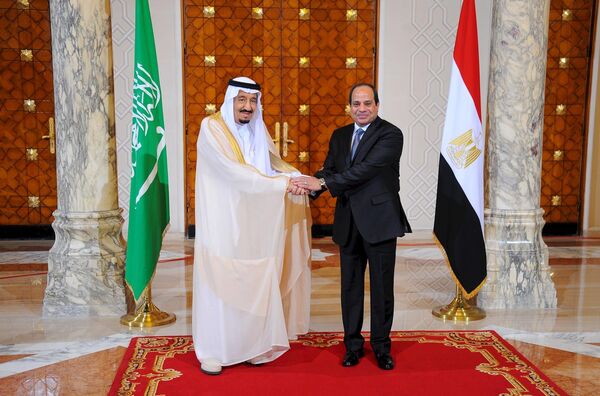
"Much attention was focused on the development of strategic cooperation in the military sphere, traditionally important to the Saudis, which may be expressed through regional joint military exercises. An agreement was signed on the establishment of a 'Council for the Implementation of the Cairo Declaration', involving the creation of a united Arab armed forces and [promises of] a joint response of Arab states to security challenges in the region."
Riyadh sweetened the pot through economic aid, promising $4 billion in investments for the development of infrastructure, agriculture and energy (adding to the $400 million already agreed to in February). Another $1.5 billion in Saudi investments are expected to be forthcoming for the expansion of the Suez Canal, and a joint investment fund with $16 billion in capital was also announced.
One of the most significant moments of the visit was the agreement on the construction of a bridge across the Red Sea which to link the two countries. "The project," Tyukaeva recalled, "is one that has been discussed for several decades. No less sensational was Cairo's decision to transfer the Sanafir and Tiran islands. The 'gift' is comparable in generosity to the Saudi investment promises, especially in view of the grave condition of the Egyptian economy, which has been kept afloat in recent years exclusively thanks to its Gulf partners. However, the attempt by the Egyptian leadership to present the decision as an issue separate from financial deals failed, resulting in ongoing anti-government protests."
Moving on, in the course of his Ankara visit, where he was met at the airport by President Erdogan personally (something "unprecedented and not part of Turkish diplomatic protocol"), Salman was awarded the highest Turkish honor – the Order of the Republic, "and named 'the guarantor of stability and security in the region'."
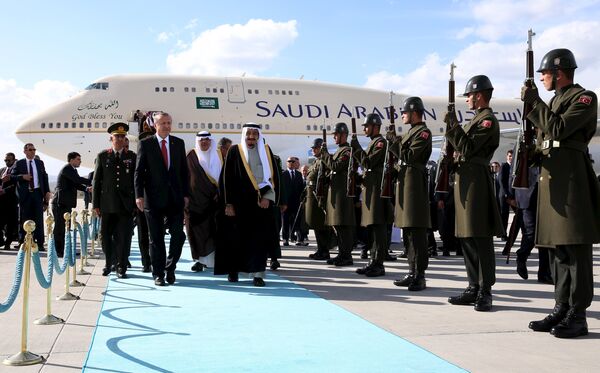
"In the final communique of the summit, Iran was accused of interfering in the internal affairs of states in the region, and of supporting terrorism. President Hassan Rouhani, who was also present, condemned Saudi Arabia for the execution of Shiite cleric Nimr al-Nimr in January."
Altogether, Tyukaeva says, the spike in Saudi diplomatic activity serves to demonstrate the country's search for a new role in the post-Iran deal world. "In Riyadh, at both the political and expert level, the voices of dissatisfaction with the actions of the Obama administration in the Middle East are growing louder and louder," and include the Iran nuclear agreement, but also the US pivot on Syria.
"It's notable," the analyst notes, "that Washington is being criticized for reducing its engagement with regional issues. This, combined with the new vision of King Salman and his clan, and the spurring of a ruinous war in Yemen, is forcing Riyadh to intensify its activities in the region by cobbling together a union of 'like-minded' Sunni states to confront the main threat to the Kingdom's security – Iran."
At the same time, the analyst notes, Washington's concerns with energy prices and with terrorism mean that its relations with the Saudis is unlikely to undergo a fundamental shift any time soon. "Riyadh needs weapons and security guarantees which no one else can give them."
Unfortunately for Riyadh, Tyukaeva notes, "it appears that the broad gestures and symbolic statements, no matter how logical they may sound, may just be an attempt to divert attention from a number of fundamental and intractable problems."
"Firstly, no matter how profitable cooperation with Saudi Arabia may be, Egypt remains cautious regarding Riyadh's belligerent military initiatives – whether in Syria or Yemen, and on the whole does not support Saudi Arabia's anti-Iranian initiatives."
"Second," the analyst argues, "Saudi Arabia's persistent attempts to mediate the normalization of relations between Cairo and Ankara cannot succeed, since their basis is the Turkish side's rejection of the current Egyptian government and its categorical [negative] attitude toward the Muslim Brotherhood."
Thirdly, when it comes to the Syrian issue, "Saudi and Turkish interests converge only on the issue of the need to overthrow Bashar Assad. Despite tactical cooperation between the militant groups in Syria supported by Ankara and Riyadh, Turkey and Saudi Arabia are looking to solve fundamentally different problems. This is reflected in the growing competition between the Supreme Council for Negotiations (the body established following the conference of the Syrian opposition in Riyadh in December to participate in the Geneva talks), and the official organ of the Syrian operation, the National Coalition," (which is supported by Turkey).
The Saudi effort to create an Islamic anti-terrorist coalition, ambitiously described as the 'Sunni NATO', "looks just as absurd and unworkable," the analyst says.
Finally, and perhaps most importantly, "despite all the efforts of Saudi Arabia to rally under its command a 'Sunni front' of Arab and Muslim countries, most of them do not intend to abandon the opportunities for large-scale economic cooperation with Iran after the lifting of sanctions."
All this, Tyukaeva notes, is only further complicated by Turkey's own ambitions for the leadership in the Middle East and of the Islamic world. "Neither the Arab governments, nor Islamic governments as a whole have a commonly recognized leader, nor a common goal, nor even a common enemy. Each country is looking out for itself, on their own or in temporary alliances with others, to achieve their own economic, political and military interests."
Tehran, meanwhile, is not sitting idly by either, amid the Saudi machinations, and "steadily maintains its positions in Syria, Iraq, Lebanon, Yemen and the Gulf, not going on the offensive, but at the same time working to restrict the leadership ambitions of Saudi Arabia and Turkey" in the region.

